外研版七年级英语上册Module 3 Unit 2 The library is on the left of the playground.单词课件+嵌入单词音频 (共18张PPT)
文档属性
| 名称 | 外研版七年级英语上册Module 3 Unit 2 The library is on the left of the playground.单词课件+嵌入单词音频 (共18张PPT) | 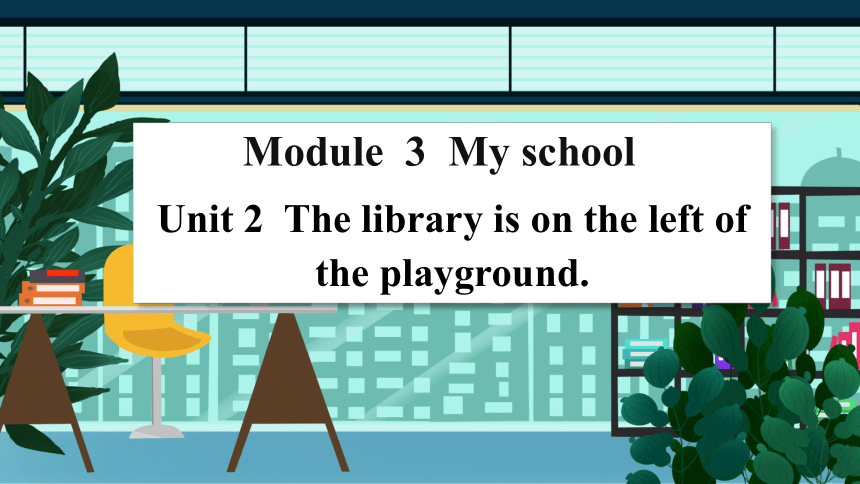 | |
| 格式 | zip | ||
| 文件大小 | 10.2MB | ||
| 资源类型 | 教案 | ||
| 版本资源 | 外研版 | ||
| 科目 | 英语 | ||
| 更新时间 | 2021-12-16 13:50:56 | ||
图片预览

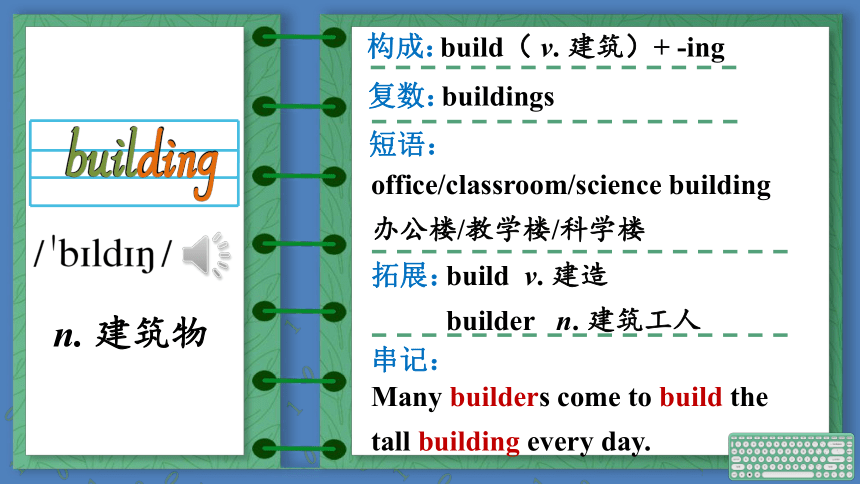
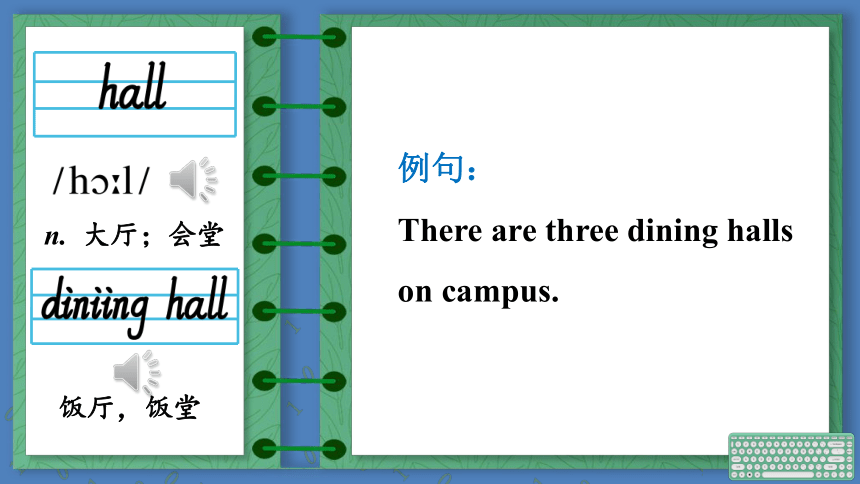
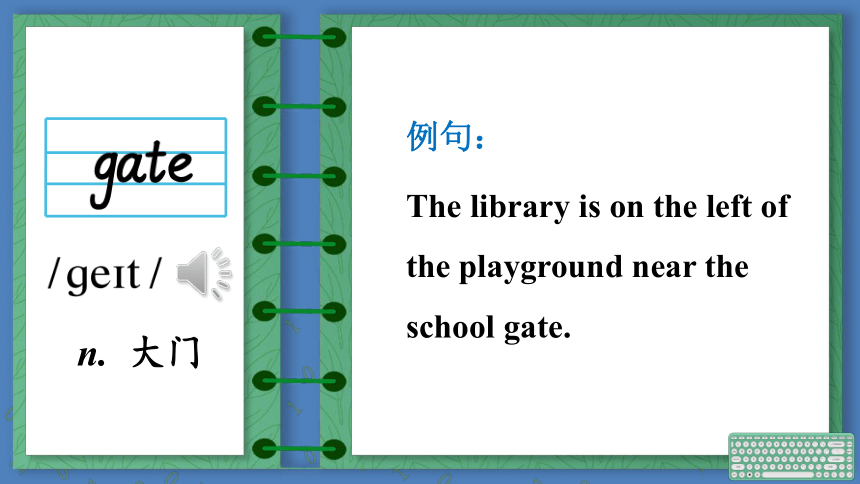
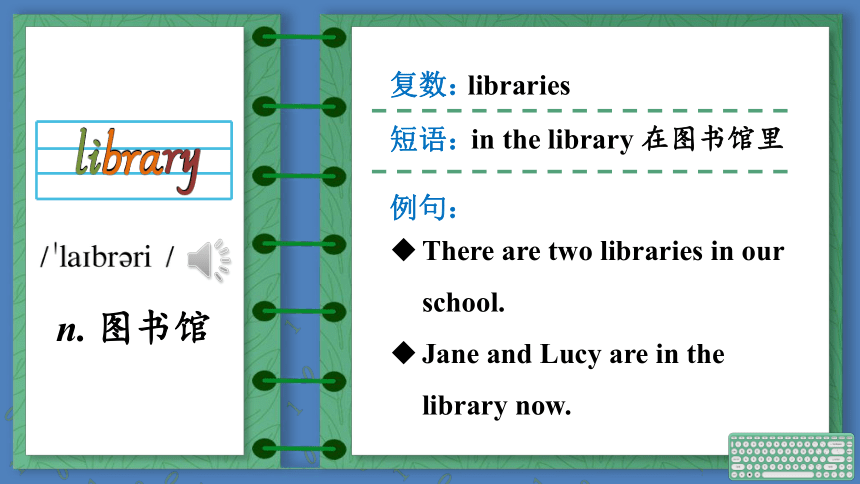
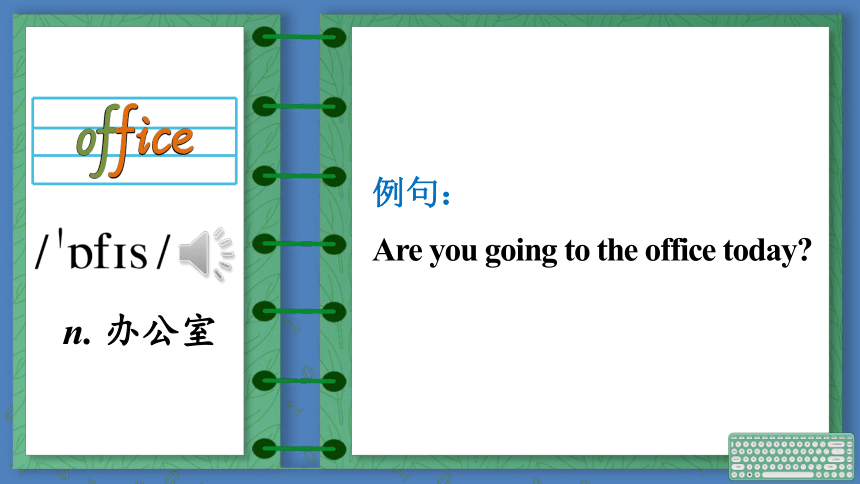
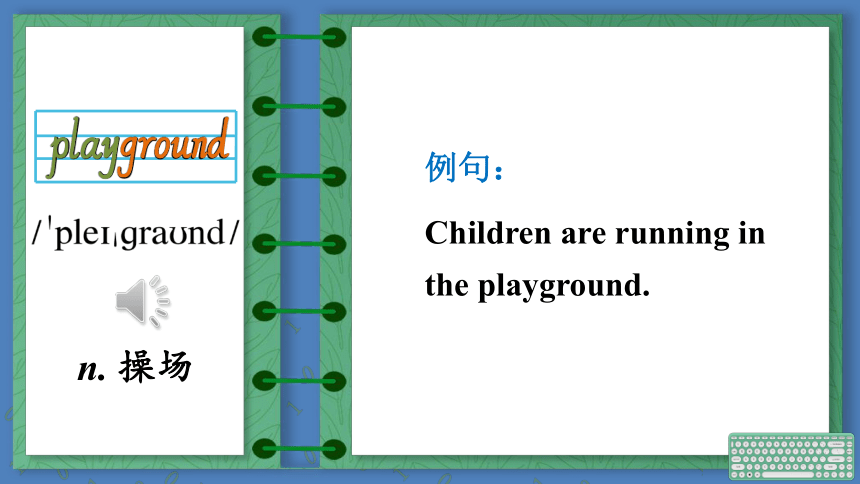
文档简介
(共18张PPT)
Module 3 My school
Unit 2 The library is on the left of the playground.
构成:
build( v. 建筑)+ -ing
n. 建筑物
复数:
buildings
拓展:
build v. 建造
builder n. 建筑工人
串记:
Many builders come to build the tall building every day.
短语:
office/classroom/science building
办公楼/教学楼/科学楼
例句:
There are three dining halls on campus.
n. 大厅;会堂
饭厅,饭堂
例句:
The library is on the left of the playground near the school gate.
n. 大门
复数:
libraries
短语:
in the library 在图书馆里
n. 图书馆
例句:
There are two libraries in our school.
Jane and Lucy are in the library now.
例句:
Are you going to the office today
n. 办公室
例句:
Children are running in the playground.
n. 操场
短语:
science lab 科学实验室
n. 科学;科学课
例句:
What did you do in science class today
拓展:
scientist n. 科学家
例句:
He went back to the lab.
n. 实验室
= laboratory
反义短语:
in front of 在……前面
prep. 在……后面
辨析:behind与after
behind 常用于表示位置或方向上的“在……后面”。
after 常用于表示时间或顺序上的“在……后面”。
串记:
After an hour, you can sit behind Jim.
短语:
between… and… 在……和……之间
例句:
There’s a hotel between the station and the hospital.
prep. 在……之间
讲解:
between介词,意为“在……之间”,通常指在两者之间。 between后面接人称代词时,要用宾格形式。
短语:
in the middle of 在……中间
既可以表示时间,也可以表示地点。
例句:
We have lunch at school in the middle of the day.
Who’s the boy in the middle of the photo
n. 中间;中央
短语:
living room 起居室,客厅
n. 房间;室;
屋子
例句:
I think Simon in his room.
拓展:
room n. 空间
讲解:
many形容词,意为“许多,很多”,修饰可数名词。
搭配:
too many 太多,用于修饰可数名词复数;
how many 多少,后接可数名词复数,用来对可数名词的数量进行提问。
adj. 许多,很多
例句:
I have a nice garden with many flowers.
多少
讲解:
really副词,意为“真正地;非常,很”,一般用来修饰形容词、动词或副词等,起加强语气的作用。
例句:
These ideas are really good.
adv. 真正地;非常,很
拓展:
(1)really可单独使用,常用于口语中,意为“真的吗”,表示感兴趣、惊讶、疑问或恼怒。读时要用升调。
—There are seven people in my family.
—Really You have a big family.
(2)real adj. 真的
例句:
There is a new bookshop near the Center Park.
prep. 靠近;接近
拓展:
(1) near adj. 近的;接近的
His house is very near.
(2) near adj. 近;在附近
Don’t come near. It’s dangerous.
例句:
They have a house with a big garden.
John often takes a walk with his grandpa after dinner.
拓展:
with 还可意为“使用”。
Jim writes with a pencil.
prep. 与……在一起;
和;
具有(品质、特征)
讲解:
for作介词,意为“为,为了”,表示目的或用途。
例句:
This book is for children.
prep. 为,为了
拓展:for的其他常见用法
(1)表示“因为”。
Thank you for your help, Mike.
(2)表示“计,达”等,表示时间、距离或数量。
We want to stay there for five days.
(3)表示“(表示去向)往,向”。
(4)表示“对于”。
Module 3 My school
Unit 2 The library is on the left of the playground.
构成:
build( v. 建筑)+ -ing
n. 建筑物
复数:
buildings
拓展:
build v. 建造
builder n. 建筑工人
串记:
Many builders come to build the tall building every day.
短语:
office/classroom/science building
办公楼/教学楼/科学楼
例句:
There are three dining halls on campus.
n. 大厅;会堂
饭厅,饭堂
例句:
The library is on the left of the playground near the school gate.
n. 大门
复数:
libraries
短语:
in the library 在图书馆里
n. 图书馆
例句:
There are two libraries in our school.
Jane and Lucy are in the library now.
例句:
Are you going to the office today
n. 办公室
例句:
Children are running in the playground.
n. 操场
短语:
science lab 科学实验室
n. 科学;科学课
例句:
What did you do in science class today
拓展:
scientist n. 科学家
例句:
He went back to the lab.
n. 实验室
= laboratory
反义短语:
in front of 在……前面
prep. 在……后面
辨析:behind与after
behind 常用于表示位置或方向上的“在……后面”。
after 常用于表示时间或顺序上的“在……后面”。
串记:
After an hour, you can sit behind Jim.
短语:
between… and… 在……和……之间
例句:
There’s a hotel between the station and the hospital.
prep. 在……之间
讲解:
between介词,意为“在……之间”,通常指在两者之间。 between后面接人称代词时,要用宾格形式。
短语:
in the middle of 在……中间
既可以表示时间,也可以表示地点。
例句:
We have lunch at school in the middle of the day.
Who’s the boy in the middle of the photo
n. 中间;中央
短语:
living room 起居室,客厅
n. 房间;室;
屋子
例句:
I think Simon in his room.
拓展:
room n. 空间
讲解:
many形容词,意为“许多,很多”,修饰可数名词。
搭配:
too many 太多,用于修饰可数名词复数;
how many 多少,后接可数名词复数,用来对可数名词的数量进行提问。
adj. 许多,很多
例句:
I have a nice garden with many flowers.
多少
讲解:
really副词,意为“真正地;非常,很”,一般用来修饰形容词、动词或副词等,起加强语气的作用。
例句:
These ideas are really good.
adv. 真正地;非常,很
拓展:
(1)really可单独使用,常用于口语中,意为“真的吗”,表示感兴趣、惊讶、疑问或恼怒。读时要用升调。
—There are seven people in my family.
—Really You have a big family.
(2)real adj. 真的
例句:
There is a new bookshop near the Center Park.
prep. 靠近;接近
拓展:
(1) near adj. 近的;接近的
His house is very near.
(2) near adj. 近;在附近
Don’t come near. It’s dangerous.
例句:
They have a house with a big garden.
John often takes a walk with his grandpa after dinner.
拓展:
with 还可意为“使用”。
Jim writes with a pencil.
prep. 与……在一起;
和;
具有(品质、特征)
讲解:
for作介词,意为“为,为了”,表示目的或用途。
例句:
This book is for children.
prep. 为,为了
拓展:for的其他常见用法
(1)表示“因为”。
Thank you for your help, Mike.
(2)表示“计,达”等,表示时间、距离或数量。
We want to stay there for five days.
(3)表示“(表示去向)往,向”。
(4)表示“对于”。
同课章节目录
- Starte
- Module 1 My teacher and my friends
- Module 2 My English lesson
- Module 3 My English book
- Module 4 My everyday life
- Module 1 My classmates
- Unit 1 Nice to meet you.
- Unit 2 I'm Wang Lingling and I'm thirteen years ol
- Unit 3 Language in use.
- Module 2 My family
- Unit 1 Is this your mum?
- Unit 2 These are my parents.
- Unit 3 Language in use.
- Module 3 My school
- Unit 1 There are thirty students in my class.
- Unit 2 The library is on the left of the playgroun
- Unit 3 Language in use.
- Module 4 Healthy food
- Unit 1 We've got lots of apples.
- Unit 2 Is your food and drink healthy?
- Unit 3 Language in use.
- Module 5 My school day
- Unit 1 I love history.
- Unit 2 We start work at nine o'clock.
- Unit 3 Language in use.
- Revision module A
- Module 6 A trip to the zoo
- Unit 1 Does it eat meat?
- Unit 2 The tiger lives in Asia.
- Unit 3 Language in use.
- Module 7 Computers
- Unit 1 How do I write my homework on the computer?
- Unit 2 When do you use a computer?
- Unit 3 Language in use.
- Module 8 Choosing presents
- Unit 1 I always like birthday parties.
- Unit 2 She often goes to concerts.
- Unit 3 Language in use.
- Module 9 People and places
- Unit 1 We're enjoying the school trip a lot.
- Unit 2 They're waiting for buses or trains.
- Unit 3 Language in use.
- Module 10 Spring Festival
- Unit 1 Are you getting ready for Spring Festival?
- Unit 2 My mother's cleaning our houses and sweepin
- Unit 3 Language in use.
- Revision module B
